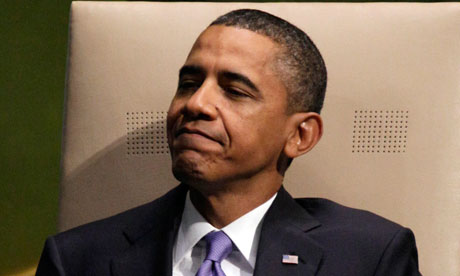 Barack Obama's speech at the UN was the visible focus of a mass of diplomatic activity aimed at patching the peace process together. Photograph: Richard Drew/AP Barack Obama sought to hold the shaky Middle East peace process together today by making a direct appeal from the podium of the UN general assembly to Israel to extend its moratorium on settlement building in the occupied West Bank.
Barack Obama's speech at the UN was the visible focus of a mass of diplomatic activity aimed at patching the peace process together. Photograph: Richard Drew/AP Barack Obama sought to hold the shaky Middle East peace process together today by making a direct appeal from the podium of the UN general assembly to Israel to extend its moratorium on settlement building in the occupied West Bank.With the 10-month freeze due to expire on Sunday, the fledging peace talks relaunched amid fanfare in Washington this month already look threatened.
The Israeli coalition government has so far refused to extend the moratorium, and the Palestinians warn that resumption of unencumbered construction by Israeli settlers in the occupied territories may lead them to quit the negotiations.
In a half-hour address to leaders of the 192 countries that form the UN general assembly, Obama depicted the crisis over settlements as a test that was fast approaching. "Israel's settlement moratorium has made a difference on the ground, and improved the atmosphere for talks. ... We believe that the moratorium should be extended. We also believe that talks should press on until completed. Now is the time for the parties to help each other overcome this obstacle."
To balance the pressure he placed on the Israeli prime minister, Binyamin Netanyahu, Obama reiterated the traditional US commitment to the state of Israel and told supporters of an independent Palestinian state to "stop trying to tear Israel down".
The president's speech was just the visible focus of a mass of diplomatic activity at the UN today aimed at patching the nascent peace process together in the wake of the escalating dispute over the moratorium. The US secretary of state, Hillary Clinton, and the US Middle East envoy, George Mitchell, were engaged in numerous one-to-one discussions behind the scenes at the UN.
European diplomats were also busy, as well as the British foreign secretary, William Hague, who talked to the Israeli foreign minister, Avigdor Lieberman, by phone before coming to New York.
Netanyahu's problem is that he must find a way to avoid angering the US, the main diplomatic and financial backer of Israel, while holding together the coalition over which he presides, and which is weighted towards pro-settler parties.
"No one is putting money on which way this will go," a western diplomat said.
Obama said the stakes were high. If agreement was not reached, he said, "the hard realities of demography will take hold. More blood will be shed. This Holy Land will remain a symbol of our differences, instead of our common humanity."
Although the Middle East formed the core of Obama's speech to the UN, he also spoke of the stand-off with Iran over its nuclear programme.
Obama said Iran would be held accountable if it failed to meet its responsibilities under international conventions. "The Iranian government must demonstrate a clear and credible commitment, and confirm to the world the peaceful intent of its nuclear programme."
Obama underlined that the door to talks remained open. The Israeli newspaper Haaretz said it had been told unofficial diplomatic channels between US and Iranian officials had been opened at the UN.
The Iranian president, Mahmoud Ahmadinejad, was expected to give his rejoinder when he took the podium. He has spent all week in New York and has been doing the rounds of TV networks, delivering robust soundbites. On CNN's Larry King Live he accused Netanyahu of being a "skilled killer" of women and children, and he predicted to ABC News that there would be a war that would "know no boundaries" if the US were to attack Iran's nuclear facilities.
International sanctions continue to tighten on Iran. This week Russia banned sales of its anti-aircraft missiles system to the country. The Iranian defence minister, General Ahmad Vahidi, accused Russia of caving in to western pressure.
"We think Russia should show it has an independent stance in choosing its relations with other countries, as well as on international issues," he said on Iranian state TV.
Russia was party to a fourth round of sanctions imposed by the UN security council in June designed to push the Iranian regime to pulling back from what is an alleged attempt to build an atom bomb. Tehran has consistently denied the charges, saying it is only interested in generating nuclear power.
No comments:
Post a Comment